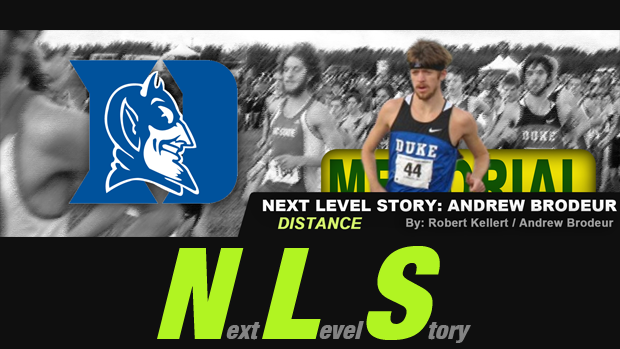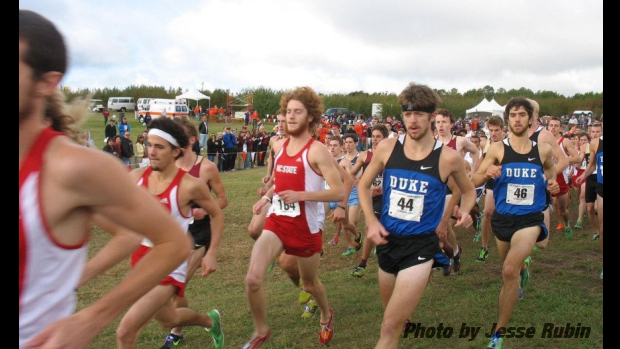
In the second issue for Next Level Stories on NJRunners a New Jersey native and Brick Memorial / Duke University alumnus Andrew Brodeur shares his experience and view in two separate essays for me. The first reads about how he came to his decision to run in college, the second "Bridging the Gap" covers more of his actual transition experience from high school cross country to college. Keep an eye out for these articles on Tuesdays here at NJRunners. Looking for field and women athlete perspectives as well!
——————————————————————————————————————-
“The Decision to Run in College”
Running in college has been one of the most rewarding experiences I could have asked for in life. I have met all different kinds of people and was exposed to high level of training. I have come to love the sport so much in college that I decided to train to become a coach this year. I honestly cannot imagine college without running.
How we come to decide to run in college is different for everyone. However at some point, I think it comes down to a certain race experience or even a certain string of races that triggers the decision; a race that makes you feel like “I can compete in college.” This was certainly the case for me although I probably made the decision much earlier than most. I can tell you the moment I decided. It was the late spring of my freshman year in high school…
I was toeing the line at A&T University in Greensboro, North Carolina. It was the freshman mile in Nike Outdoor Nationals (NON). Earlier in the season I had run a 4:34 which was good enough to qualify me for the event. I was coming off a string of subpar races though in the 3200. I just qualified for Group IV at sectionals and then at the Group IV meet I was one of the first wild cards out of Meet of Champions. But I never could have anticipated what was going to happen at NON.
I went into the last lap in first only to get passed a few meters later by a few runners. I held onto third until the last 100 meters where I got outkicked. I got fourth running a time of 4:28.99 for the full mile. I could not believe it. I was ushered over to a podium, given a shiny medal, and a piece of paper with the words All America on it. It was a dream come true. I felt like I competed on one of the highest levels of the sport and fought hard. It was this race that made me decide I wanted to run in college. I felt I had a future in competing at the highest level in the NCAA.
But don’t get me wrong, I was a naive freshman with three years of high school running still ahead of me. Just like every other runner my seasons were filled with ups and downs. I had my fair share of injuries including stress fractures and muscle pulls. I had some great races and some bad races then some really terrible races. The workouts got harder and the runs longer. I did this because I wanted to run in college.
Finally, I found my senior year that there was an extra something I needed. In fact, it was really the only thing I needed. I came to the realization that I simply loved the sport of running. All the work and miles I was putting in was not just because I wanted to run in college but also because I loved it. Running became an important part of my life. I could not go a day without running.
We all make the decision to run in college differently but I decided that all you really need is love of the sport to run in college. You do not need the greatest races of all time or a fancy personal coach. All you need to do is get out there and run. The United States has a college out there for all kinds of different runners. All you have to do is go looking for it. Trust me, you do not want to miss out on the opportunity.
-Brodie
——————————————————————————————————————-

“Bridging the Gap”
I know what you’re thinking – 5 miles is a lot further than 3.1. An extra 3ks changes up the race big time. It’s true. The distances of 8k and 10k are considered by some to be “whole different monsters.” For a freshman, the race seems fairly mind-boggling. Oh yes, I remember my first college cross country race…
It was pouring rain on the University of Virginia’s staple course Panorama Farms. It was an all-grass course with more hills than Holmdel Park which I did not know was possible at the time. Coming from the modest school of Brick Memorial, I was not used to running as part of a competitive team. The pace went out harder than I anticipated going through the mile in 4:55 on the unforgivable hills. I found myself in a small pack composed of me and two other teammates – one a freshman like me and the other a seasoned veteran junior. We ran together for about 2.5 miles. Then the freshman started having an asthma attack and the junior started turning green (seriously) going into the last mile. I was alone after that and I remember climbing the last hill and thinking I will not make it if this is not the last turn. My legs were on fire and getting harder to turn over with each step.
Luckily, it turned out to be the last turn and I made it across the line in a time of 25:24. I experienced a lot of pain and also witnessed a lot of “death and destruction”. No doubt it was scary. With all this anguish however came a silver lining. I had come through 5k in about 15:45ish which came pretty darn close to my high school 5k PR of 15:24. On a tougher course and over a longer distance, I ran close to my 5k PR from high school. This was something to be happy about. This gave me a lot of confidence in the upcoming season.
Point is that yes college cross is different from high school cross. College and, especially DI, is extremely competitive. County championships are good and all but do not expect to be number 1 in your first college race. A new distance takes adjustment and sometimes a few attempts. Training for college cross can be completely different from what you are use to in high school. I ran probably about 50 miles a week in high school but during my freshman year that number increased to about 75. Longer races require more miles in the bank put simply.
This change in training is often the toughest change for incoming freshman. In college, a coach is trying to take a bunch of guys from different running backgrounds and attempts to devise a training plan for this diverse group. It is often the case that the new training is dramatically different from high school and requires drastically higher mileage. I have seen a lot of freshman overextend themselves trying to hit mileage that more experienced seniors are hitting which could be from 80 to 100 miles. This inevitably leads to injury and you do not learn anything about college racing being injured. This transition to higher mileage is best done very gradually.
What I am trying to get at here is that freshman year is all about learning. Think of it as a kind of transformation. You will have upperclassmen and coaches to assist you during this period and they will guide you down the right direction. Through racing the new distances, you learn about a new pain. Through gradually higher mileage, you learn about increasing your endurance. Through monitoring your splits, you may learn that your pace during these longer races may not be so different from high school. Like every sport, running 8k and 10k requires practice. It may not come together the first time but it’s the tenacious spirit inherent in all distance runners that keeps us coming back for more. So chin up and eyes forward when you first toe the line in college cross country.
-Brodie

Thanks Brodeur for the colorful insight expressing your experience and view on Div I cross country.
Andrew Brodeur hails from Brick, NJ and went to Brick Memorial High School in Ocean County. He is a Duke University graduate, May 2012, with a Bachelor of Science in Biological Anthropology and Anatomy. He has competed in 4 seasons of Division I Cross Country. He garnered All-ACC and All-Southeast Region Honors. In high school, Brodeur was runner-up at the NJISSA Meet of Champions running 15:50 at Holmdel Park.
If you would like to find more about his athletic bio at Duke you can find it here. He performed very well on the track too.
As Brodeur said it will take plenty of patience becoming used to college running and building towards that junior or senior year form. Also if you’re an athlete that isn't among the elite don’t let this article scare you out of running in college. There are programs all over the place that you can find which are more suitable for each type of runner or athlete’s level. However if you are going to be an elite runner in Division I, gear up and take notes.
Hope you enjoyed this story, I'm now looking for some FIELD ATHLETES especially, and some women to interview for their perspective Keep sending in suggestions! -Robert Kellert
<p> <span style="font-size:16px;"><span style="box-sizing: border-box; margin: 0px; padding: 0px; border: 0px; outline: 0px; vertical-align: baseline; font-family: Arial; color: rgb(178, 34, 34);"><span style="box-sizing: border-box; margin: 0px; padding: 0px; border: 0px; outline: 0px; vertical-align: baseline; background-color: transparent; font-family: arial, helvetica, sans-serif;">If you are and or know an athlete that would make a great Next Level Story for this series send them in to </span></span><span style="box-sizing: border-box; margin: 0px; padding: 0px; border: 0px; outline: 0px; vertical-align: baseline; color: rgb(0, 0, 0); font-family: Arial;"><span style="box-sizing: border-box; margin: 0px; padding: 0px; border: 0px; outline: 0px; vertical-align: baseline; background-color: transparent; font-family: arial, helvetica, sans-serif;">rkellert@milesplit.com</span></span><span style="box-sizing: border-box; margin: 0px; padding: 0px; border: 0px; outline: 0px; vertical-align: baseline; font-family: Arial; color: rgb(178, 34, 34);"><span style="box-sizing: border-box; margin: 0px; padding: 0px; border: 0px; outline: 0px; vertical-align: baseline; background-color: transparent; font-family: arial, helvetica, sans-serif;"> but note that not every athlete sent in will be chosen, at least right away. I want to hit all levels, Division I, II, or III. Past New Jersey Athletes prefered please.</span></span></span></p> <p> <span style="font-size:18px;"><strong>HEY did you enjoy this article? Then check out the past Next Level Stories here.</strong></span></p>

